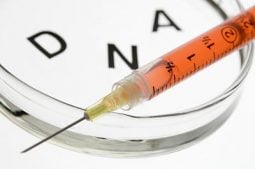Donated eggs are used in 35% of assisted reproduction treatments in IVI clinics. Sperm donation is often used in cases of male infertility or when there is no male partner. Our aim at IVI is to ensure that assisted reproduction treatments mirror natural reproduction as closely as possible. And that means that compatibility between donors and recipients is key.
How are donated eggs or sperm selected?
Through a complex process, biologists classify eggs or sperm for recipients primarily in terms of what is known as a phenotype. The phenotype is determined by the physical features of an individual that can be observed with the naked eye, such as eye colour, skin colour, height and build.
Spanish law sets out clear criteria that specialists must follow when selecting gametes for a recipient. It stipulates that there should the greatest phenotypic (external appearance) and immunological (blood group and Rh) similarity possible between the donor and the recipient.
In the case of embryo adoption, the selection is made following the same protocol.
It is the specialist who determines the phenotype in accordance with Spanish law. The parent(s) cannot, at any point, choose the physical features or sex of their future baby; this is prohibited by law.
How long must I wait if I need a donor?
In the case of sperm donation, there is no waiting list at IVI. In the case of egg donation or embryo adoption, this will depend on the compatibility between the donor and the recipient. If a recipient has a more common phenotype there is virtually no waiting list. However, a recipient whose phenotype is less common among the population may experience a longer wait.
All IVI donors undergo the most advanced genetic testing, such as TCG547, to detect genetic diseases that could be transmitted. Using the information gathered from these tests, in conjunction with tests on the other partner who is using his or her own gametes, we can rule out the possibility of passing on up to 600 genetic diseases.
What requirements must donors meet?
- They must be aged between 18 and 34.
- They must live within 30-40 km of one of the IVI assisted reproduction clinics that has an egg or sperm bank, or travel to one of these cities regularly.
- They must be healthy and free of all sexually transmitted or hereditary diseases.
What tests do egg donors undergo?
To be accepted on the IVI oocyte donation programme, women must agree to undergo assisted reproduction testing, as required by Spanish law. In addition, they must agree to additional testing, such as: a complete medical and psychological examination to provide us with valuable information about their fertility, their health and their potential to be mothers. They are also given a complete gynaecological examination to rule out the presence of cysts, fibroids, polyps and any other reproductive anomalies. In addition, we perform a chromosome study (karyotype) to reduce the risk of future anomalies in their babies or oocyte recipients. The absence of infectious diseases such as HIV, hepatitis and syphilis is also confirmed during these tests and the blood type and Rh are determined.
What about sperm donors?
Sperm samples are quarantined to reduce the risk of passing on any sexually transmitted diseases. Each donor also undergoes a series of genetic tests (karyotype) and his personal anamnesis (medical history) is studied, as well as that of his family, in order to reduce the risk of transmitting any genetic diseases.
IVI operates the largest gamete bank in Spain and, as a result, waiting times for treatments requiring donors are generally very short.




Comments are closed here.